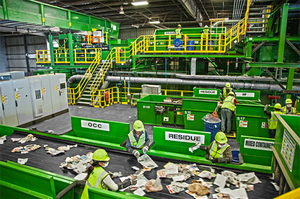The second full day of the Solid Waste Association of North America’s annual WASTECON event in Orlando brought a host of more insights and observations on the waste and recycling industry.
Among the biggest highlights was mega session with Nate Morris, CEO of Rubicon Global, and a safety summit meeting exploring the issue of fires.
Here are 12 takeaways from the event’s second day.
In a session on mixed waste processing, Steve Miller, CEO, Bulk Handling Systems, outlined how today’s advanced mixed waste MRFs are a far cry from older so-called dirty MRFs. Today’s systems process higher volumes and produce higher quality end products. “It's really up to each community and whether it fits with your goals and models,” Miller said. One driver is “lower transportation costs. One central MRF also means lower labor and lower infrastructure costs. And you have to ask, how do you get at the organics stream? If you want to process that commercially, reasonably, you can do separate programs, which can be expensive and difficult. These systems would be an option to recover that. There are issues in cleaning, but that can be addressed.”
Patrick Carroll, director of facilities development with Solid Waste Authority of Palm Beach County, looked at whether today represents a new beginning for waste to energy. Palm Beach County recently began operation of the largest WTE facility in the country—the first new facility built in the U.S. in 20 years.
Carroll pointed to five challenges that must be overcome in pursuing WTE development.
They are not designated as renewable at all levels of government. This can be significant because it could affect prices paid for energy in power purchase agreements.
The expansion of shale gas drilling has led to lower natural gas prices. That has lowered the market price for gas, which cuts into the potential revenue streams for WTE plants.
There is a perceived regulatory burden. However, environmental and emission standards haven’t changed significantly and it is still possible to permit these facilities.
WTE facilities are capital intensive. And a time when municipal budgets are constantly under strain, it can be difficult to marshall the necessary funding to get them built.
As with most other waste-related facilities, WTE plants often face public opposition.
Carroll said that the county made a conscious decision to build Palm Beach Renewable Energy Facility #2 larger than its present day needs. “We wanted to grow into it,” he said. “We think that will be a tremendously successful decision.” Currently there’s about a 30 percent gap between the waste the county generates and how much the facility can handle. To close that gap, Palm Beach County has short-term and medium-term contracts in place to import trash to keep the facility running at peak capacity. As Palm Beach’s volume of MSW grows, it will import less waste from surrounding areas.
During the day’s mega session on using innovation and technology to transform the waste industry, Nate Morris, co-founder and CEO of Rubicon Global, outlined the principals of the shared economy and the lessons of the rise of services like Airbnb and UBER have for waste industry. “Our patterns and habits are changing,” Morris said. “The way that you transact and interact with consumers and constituents has radically changed.… We have to move in that direction.”
Rubicon Global’s goal is to serve as a sourcing platform where independent haulers and recyclers have the opportunity to win business for large national accounts that wouldn’t otherwise be available to them. It also aims to facilitate direct interaction with potential consumers.
Morris said the firm has raised more than $100 million in seed capital in the past three years as it works to build its team and technology.
A safety summit session featured Larry Stone, corporate safety director, Waste Pro USA Inc., Risa Weinberger, owner, Risa Weinberger & Associates and Mark Hart, president, Training Consultants. They explored different aspects of dealing with fires at landfills, on trucks and at composting facilities.
Hart said that there are currently 8,300 landfill fires per year. The causes of more than half of landfill fires are not reported. He outlined tips for monitoring landfills and how to be aware of danger signs and shared some best practices on handling hot loads.
Stone stressed the importance to haulers of having strong relationships with local fire departments in improve the response to truck fires. "If you're not preplanning in advance of a fire, it's not going to be a friendly situation when they show up to your scene,” he said.
Stone also talked about how CNG engines need to be handled differently. “Fire departments need some training on these systems. ... They don't know these systems yet,” he said. For example, they need to be aware of the location of shutoff valves and of the potential dangers of tanks exploding.
Weinberger outlined the delicate balance that exists at composting facilities where spontaneous combustion is one of the main causes of fires. “Microorganisms make compost. When they get too hot they die, but they may also ignite when oxygen hits them,” she said. “Composting has to run hot, but not too hot.”
About the Author(s)
You May Also Like




